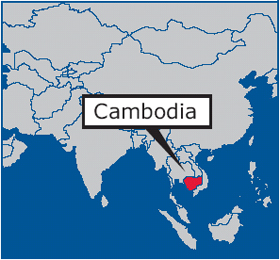First stage of historic Khmer Rouge trial ends
 Phnom Penh - The long-awaited first hearing before Cambodia's UN-backed Khmer Rouge tribunal ended Wednesday after a heated debate between lawyers over the admissibility of new evidence in the trial of the genocidal regime's former chief torturer.
Phnom Penh - The long-awaited first hearing before Cambodia's UN-backed Khmer Rouge tribunal ended Wednesday after a heated debate between lawyers over the admissibility of new evidence in the trial of the genocidal regime's former chief torturer.
Presiding judge Nil Nonn said a date for the next hearing in the trial of former Tuol Sleng torture facility chief Kaing Guek Eav, known by his revolutionary name Duch, would be announced "in due course."
"I cannot speculate as to when the date will be announced, but hopefully, the substantive hearing will begin sometime in March," tribunal spokeswoman Helen Jarvis said.
Duch faces charges of crimes against humanity, premeditated murder and breeches of the Geneva Conventions.
He has previously admitted guilt for his crimes and faces a maximum sentence of life in prison.
Prosecution and defence lawyers argued over the admissibility of film footage taken by Vietnamese soldiers inside the torture prison in Phnom Penh after the Khmer Rouge was toppled from power in January 1979.
The film was taken inside the torture facility and showed dead prisoners chained to iron beds, torture implements and five children who escaped harm by hiding under a pile of clothing.
Cambodian co-defence attorney Kar Savuth said the evidence was inadmissible because the investigating judges did not approve it during the pre-trial phase.
He questioned the film's authenticity and said its submission might have been "politically motivated."
International co-defence lawyer Francois Roux said the admission of new evidence would also "unnecessarily prolong" court proceedings.
But international co-prosecutor Robert Petit said the footage was crucial for establishing Duch's guilt.
"You can profess guilt until you are out of breath, but the tribunal still has to prove guilt," he told the court. "The court cannot do this unless all the available evidence is before it."
The investigating judges' decisions on the footage and the number of witnesses to be called were likely to be announced along with the date for the trial's next stage, tribunal spokesman Reach Sambath said.
Duch is the first of five detained former Khmer Rouge leaders to face trial before the hybrid court, which is made up of Cambodian and international judges, prosecutors and defence lawyers.
Up to 2 million people died through execution, starvation or overwork during the ultra-Maoist Khmer Rouge's 1975-79 reign when the group sought to transform Cambodian society into an agrarian socialist utopia, erase history and start at "year zero."
Duch was not called on to testify during the hearing, which began Tuesday, and sat quietly through Wednesday's session, occasionally chatting with members of the defence team.
More than 1,000 members of the public and about 200 journalists attended the hearing, held at the tribunal's chambers on the outskirts of Phnom Penh.
Tuol Sleng survivor Vann Nath, whose famous paintings depict the horrors conducted at the former high school, said he found it difficult to understand the legal terminology used during the hearing but believed justice was "finally in sight."
"I have been watching this trial for two days, and I do not understand the procedures," he said. "But we have been waiting so long for this trial to come, so we can watch and wait for justice to be brought."
Jarvis said the initial hearing was "necessarily technical" and added the tribunal had no plans to provide a simplified "how-to guide" for the court proceedings.
"We have worked to ensure the public understands the procedures of this very important tribunal, and we are setting up radio and television programmes so people can discuss aspects of the court," she said.
"The media also has a role to play in helping people to understand how the court operates," she said.
The Khmer Rouge tribunal was established in 2006 after a decade of negotiations between the United Nations and the Cambodian government.
Khmer Rouge leader Pol Pot died in 1998, but "Brother Numer Two" Noun Chea, former head of state Khieu Samphan, former foreign minister Ieang Sary and wife Ieang Thirith have been detained.
All four remaining defendants claim innocence of any wrongdoing. (dpa)